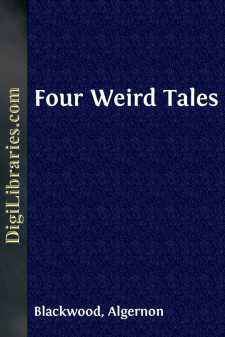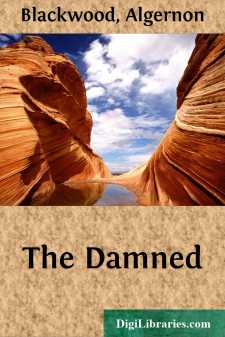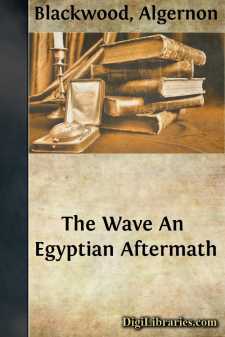Categories
- Antiques & Collectibles 13
- Architecture 36
- Art 48
- Bibles 22
- Biography & Autobiography 813
- Body, Mind & Spirit 142
- Business & Economics 28
- Children's Books 15
- Children's Fiction 12
- Computers 4
- Cooking 94
- Crafts & Hobbies 4
- Drama 346
- Education 46
- Family & Relationships 57
- Fiction 11828
- Games 19
- Gardening 17
- Health & Fitness 34
- History 1377
- House & Home 1
- Humor 147
- Juvenile Fiction 1873
- Juvenile Nonfiction 202
- Language Arts & Disciplines 88
- Law 16
- Literary Collections 686
- Literary Criticism 179
- Mathematics 13
- Medical 41
- Music 40
- Nature 179
- Non-Classifiable 1768
- Performing Arts 7
- Periodicals 1453
- Philosophy 64
- Photography 2
- Poetry 896
- Political Science 203
- Psychology 42
- Reference 154
- Religion 513
- Science 126
- Self-Help 84
- Social Science 81
- Sports & Recreation 34
- Study Aids 3
- Technology & Engineering 59
- Transportation 23
- Travel 463
- True Crime 29
Algernon Blackwood
Algernon Blackwood (1869–1951) was a British author renowned for his ghost stories and tales of the supernatural. His works, such as "The Willows" and "The Wendigo," are celebrated for their atmospheric and psychological depth, earning him a reputation as one of the finest writers in the horror genre. Blackwood also had diverse interests, including broadcasting, journalism, and nature exploration, which often influenced his storytelling.
Author's Books:
Sort by:
I After leaving Vienna, and long before you come to Budapest, the Danube enters a region of singular loneliness and desolation, where its waters spread away on all sides regardless of a main channel, and the country becomes a swamp for miles upon miles, covered by a vast sea of low willow-bushes. On the big maps this deserted area is painted in a fluffy blue, growing fainter in color as it leaves the...
more...
~I~ He painted trees as by some special divining instinct of their essential qualities. He understood them. He knew why in an oak forest, for instance, each individual was utterly distinct from its fellows, and why no two beeches in the whole world were alike. People asked him down to paint a favorite lime or silver birch, for he caught the individuality of a tree as some catch the individuality of a...
more...
Chapter I I As a boy he constructed so vividly in imagination that he came to believe in the living reality of his creations: for everybody and everything he found names—real names. Inside him somewhere stretched immense playgrounds, compared to which the hay-fields and lawns of his father's estate seemed trivial: plains without horizon, seas deep enough to float the planets like corks, and...
more...
I A considerable number of hunting parties were out that year without finding so much as a fresh trail; for the moose were uncommonly shy, and the various Nimrods returned to the bosoms of their respective families with the best excuses the facts of their imaginations could suggest. Dr. Cathcart, among others, came back without a trophy; but he brought instead the memory of an experience which he...
more...
IT will surprise and at the same time possibly amuse you to know that I had the instinct to tell what follows to a Priest, and might have done so had not the Man of the World in me whispered that from professional Believers I should get little sympathy, and probably less credence still. For to have my experience disbelieved, or attributed to hallucination, would be intolerable to me. Psychical...
more...
The Insanity of Jones I Adventures come to the adventurous, and mysterious things fall in the way of those who, with wonder and imagination, are on the watch for them; but the majority of people go past the doors that are half ajar, thinking them closed, and fail to notice the faint stirrings of the great curtain that hangs ever in the form of appearances between them and the world of causes behind....
more...
CASE I: A PSYCHICAL INVASION I "And what is it makes you think I could be of use in this particular case?" asked Dr. John Silence, looking across somewhat sceptically at the Swedish lady in the chair facing him. "Your sympathetic heart and your knowledge of occultism—" "Oh, please—that dreadful word!" he interrupted, holding up a finger with a gesture of impatience....
more...
Chapter I "I'm over forty, Frances, and rather set in my ways," I said good-naturedly, ready to yield if she insisted that our going together on the visit involved her happiness. "My work is rather heavy just now too, as you know. The question is, could I work there—with a lot of unassorted people in the house?" "Mabel doesn't mention any other people, Bill," was my...
more...
CHAPTER I. Since childhood days he had been haunted by a Wave. It appeared with the very dawn of thought, and was his earliest recollection of any vividness. It was also his first experience of nightmare: a wave of an odd, dun colour, almost tawny, that rose behind him, advanced, curled over in the act of toppling, and then stood still. It threatened, but it did not fall. It paused, hovering in a...
more...
CHAPTER I Man is his own star; and the soul that can Render an honest and a perfect man Commands all light, all influence, all fate, Nothing to him falls early, or too late. Our acts our angels are, or good or ill, Our fatal shadows that walk by us still. BEAUMONT AND FLETCHER. Minks—Herbert...
more...











